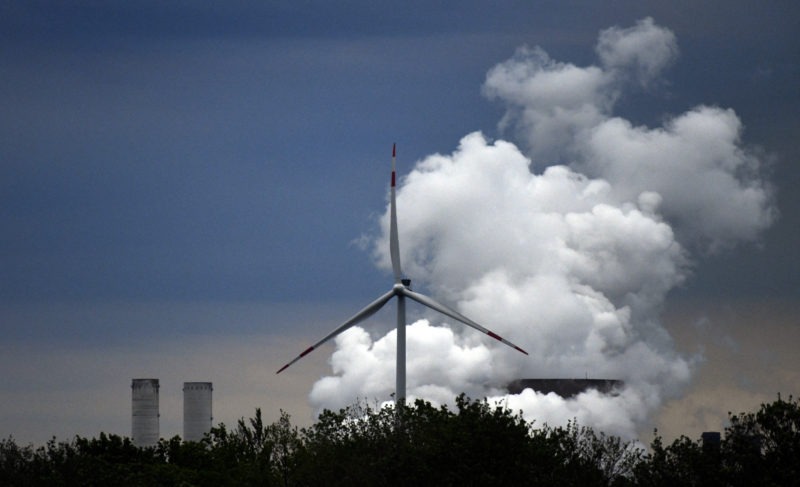Sparks fly as Germany’s climate plan hits rural landscapes
Germany is seeking to boost its renewable power sources, but the decision to close nuclear plants has led to an increased reliance on dirty coal (INA FASSBENDER)
Bad Kissingen (Germany) (AFP) – German farmer Edgar Thomas already has two towering pylons spoiling the view of the picturesque rolling hills around his land, and he’s exasperated that his area is being asked to find room for more.
But in the country’s bid to ditch fossil fuels and switch to renewables as it marches towards a carbon-neutral future, such power highways are essential to transport green energy mostly harnessed in the north to the industry-intensive south.
Thomas’ reluctance to see yet more power lines across his territory is emblematic of Berlin’s struggle to satisfy competing interests that are holding up progress towards a greener economy.
Gesturing towards the 110-kilovolt masts that already dominate his beet field close to Bad Kissingen in northern Bavaria, Thomas complained that they hinder the spraying machines he uses on its crops.
“It doesn’t work at all, I have to do things by hand,” Thomas said.
“People say, we have to produce food as cheaply as possible, we want very good food, we have to meet environmental standards, and on the other side they say we have to put up with the power lines.”
Feeling the heat from a vocal climate protest movement, German Chancellor Angela Merkel’s government plans Friday to unveil a multi-billion-euro grand plan for tackling global warming.
Merkel, a scientist by profession, was once known as the “climate chancellor” as she pushed forward a green energy transition that vastly increased clean renewables such as wind and solar power.
However, many of those gains have been eroded by an increased reliance on dirty coal, in part to offset the phase-out by 2022 of nuclear power that Merkel decided after Japan’s 2011 Fukushima disaster.
Wind farms — most in the north or out at sea — accounted for around half the almost 40 percent of Germany’s electricity that came from renewables in 2018.
In order to transport the power down south, the government wants to build power highways along three major axes through the country.
– ‘Build locally’ –
One 380-kilovolt stretch would cut right through the Bad Kissingen district — a “real problem” for the agricultural region, Thomas warned.
Initiatives have popped up along the power lines’ planned route, with municipalities deploying creative ways to block them.
As a result, of the planned 7,700 kilometres (4,785 miles) of power lines, only 950 kilometres have been built.
Despite his resistance, the local farmers’ federation leader Thomas is no climate naysayer.
Instead, he argues that the top-down approach is wrong, pointing out two wind turbines he and others in the village of Nuedlingen invested in that loom out of a copse by the field.
Local farmers run a biogas plant to supply the nearby thermal baths with heat, and Thomas can also boast solar panels on his roof.
“We should try to build smaller-scale supplies locally, and the grid too. That would be interesting for us farmers, because we like producing renewable energy,” he said.
“I have to keep my business going. And my son, he’ll want to make money, we have to look at what the economic story is.”
District administrator Thomas Bold has helped set up a petition against the new power line from his glass-roofed office in the tidy historic centre of Bad Kissingen town.
The decision to include it in the national “Grid Development Plan 2030” currently under public consultation “looks arbitrary… I have great difficulty understanding it,” he said.
– ‘We have to live with it’ –
Known as P43, the path would run for 130 kilometres (81 miles) through the Rhoen region’s gentle hills, broad fields and pockets of woodland.
The picture-book rural landscape is known and treasured locally as the “land of the open distance” for its views.
“When they bring power through here on lines that aren’t needed here, but further south, of course there’s significantly less understanding than if we needed it ourselves,” Bold said.
Bold and others believe their interests were neglected at the planning meeting in June.
Afterwards, federal economy minister Peter Altmaier rejoiced that Berlin and regional governments were “pulling together” on the grid.
His Bavarian counterpart Hubert Aiwanger called the deal “a great success… and relief for citizens in northern Bavaria” after another planned stretch was cancelled.
Politicians promise the P43 will be buried underground as far as possible.
But Bold warned that the environmental cost and price tag of doing so made the plan “unrealistic”.
From the farmers’ perspective, burying the power lines simply creates a new problem.
“I dig a trench here, and it’s like a drain, the water’s gone,” said Thomas.
“It doesn’t bear thinking about what that would do to the yield” of beets in times when the weather is already becoming drier, he added.
The grower doesn’t want to join in with talk of the politicisation of the climate, agrichemicals and other factors leading to a new conflict between town and country in Germany.
But “there’s a certain growing apart,” he admitted.
“I’d like to say to people in the city, we’ll go along with it, we’re already doing a lot, but it has to be under reasonable conditions that we can live with.”
Disclaimer: Validity of the above story is for 7 Days from original date of publishing. Source: AFP.


